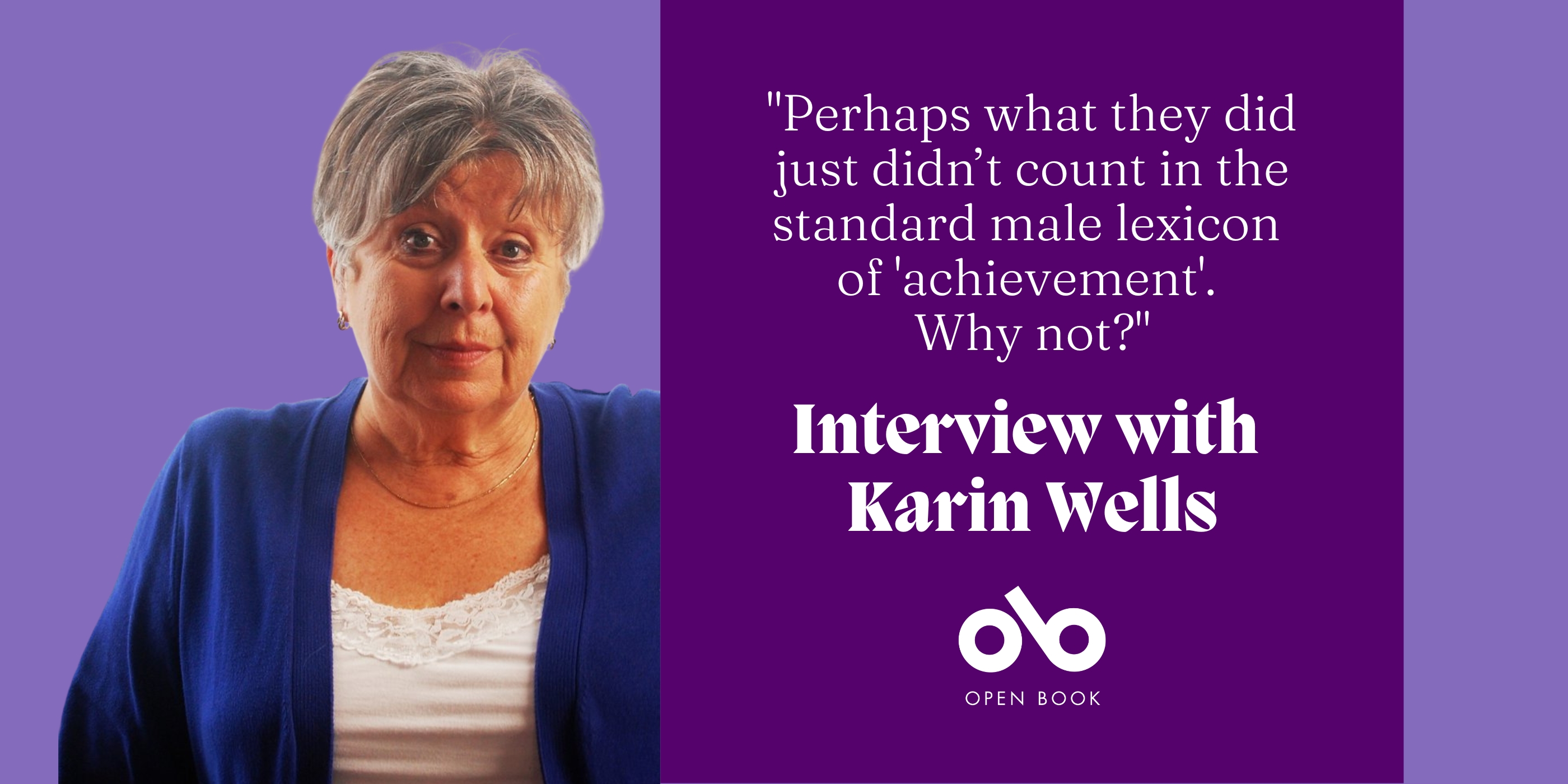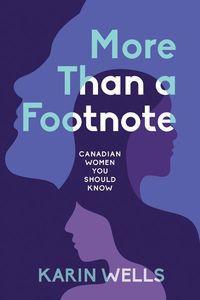Karin Wells on the Incredible, Overlooked Women in Canadian History
No one wants to read a book with half the pages ripped out. And yet that is how we're often taught history in Canada – with the accomplishments and stories of women minimized and ignored. In More Than a Footnote: Canadian Women You Should Know (Second Story Press), acclaimed, veteran journalist Karin Wells seeks to share a holistic – and fascinating – perspective of our country's most interesting, innovative, and iconoclastic contributors, bringing the women who have often been overlooked to the foreground.
From Vera Peters, a doctor who revolutionized treatments for breast cancer and Hodgkins lymphoma to artist Paraskeva Clark, who scandalized buttoned-up Toronto with her fearless views on social change and women's roles, Wells finds stories that inspire and thrill. Her enthusiasm for the women she profiles is infectious, and her research is razor sharp. She takes readers on journeys like that of Charlotte Small, a Métis woman who, with more than 40,000km of canoeing and trekking under her belt—while giving birth five times!—travelled more than three times farther than her famous American neighbours, Lewis and Clark.
We're speaking with Karin today about the brilliant and influential women in her book, her research process, and more as part of our True Story nonfiction interview series. She tells us about why historical "achievement" is very much a matter of perspective, about the brilliant computer scientist whose courage in the face of discrimination was cheer-worthy, and about the "obscure connections that created a storyline of their own" between the remarkable women she was researching.
Open Book:
Is there a question that is central to your book? And if so, is it the same question you were thinking about when you started writing or did it change during the writing process?
Karin Wells:
This began with a search for Canadian women who had been overlooked, or ignored or just dismissed. Perhaps what they did just didn’t count in the standard male lexicon of “achievement”. Why not and what really counts? Yes, a woman was Canada’s first astrophysicist, and she had to compete in a male world and that ‘counted’. But women in the outports of Labrador made mats, traditional women’s work – humble work easily dismissed but it kept their families alive when the fish failed. Which mattered more? Those were questions that made me think. But what preoccupied me from the beginning was what was it about these women that made them push ahead. Was it someone who gave them the confidence – a mother, a father, in one case a brother. Was it their own pig-headedness? Margaret Lyons the broadcast executive, Chapter 9, described herself as pig-headed. That question stayed with me.
The other big thing for me was a great affection for obstreperous, ornery women. Their stories always come with drama and often a good deal of intrigue and it’s what makes them worth reading about.
OB:
What do you love about writing nonfiction? What are some of the strengths of the genre, in your opinion?
KW:
The stories that come out of nonfiction, almost invariably, are better than anything you could make up. There is a frisson that comes every time some obscure ‘fact’ surfaces or when the light goes on and all of a sudden the feeling comes over me that I might now understand why, for example, Mina Benson Hubbard was initially so reluctant to complete the work – exploring northern Labrador – that had killed her husband and, why she changed her mind and plunged into the wilderness. Then there are the questions for which there are no absolute answers – did Mina had an affair with George Elson, her Métis guide? – but plenty of room for speculation.
Then there is absolute joy that comes from the discovery of a cache of documents, or just a note. When seemingly mousie Trixie Worsely, the computer scientist, scrawled across a typewritten memo from her male colleagues “You big bullies...” Three cheers for Trixie.
OB:
What was your research process like for this book? Did you encounter anything unexpected while you were researching?
Your CanLit News
Subscribe to Open Book’s newsletter to get local book events, literary content, writing tips, and more in your inbox
KW:
This was another covid book which meant there was not much access to archives and direct exploration; something I was certain I needed. As a journalist I seldom settled for a telephone interview. I wanted to eyeball a person, to see them where they lived and worked but none of that was possible. The subjects were all dead – with the exception of Isabel Brown Crook who is 106 and living in China – and friends and relatives all seemed to be somewhere out of reach but it didn’t matter. This was Alice’s trip down the rabbit hole. It’s hardly original, but one click, led to another, one link opened hundreds more pages of diaries and letters. Days at my dining room table were positively exciting.
As for the unexpected... I knew the basics of several of the stories having worked on some of them when I was working for CBC radio but there were so many surprises – obscure connections that created a storyline of their own. I had dimly thought of writing about the cellist Zara Nelsova and I knew I wanted to write about Mina Benson Hubbard but when I read Mina’s biography and discovered that she had staged a benefit event in the 1930’s for Zara and her sisters when they were children – the die was cast. So many of these women had strange connections to each other. Allie Vibert Douglas, the astrophysicist, made childhood visits to her parents’ graves in the Mount Royal Cemetery and would have walked past the then unmarked grave of Charlotte Small, the Métis wife of explorer David Thompson and on it went.
But that’s the research.
OB:
What do you need in order to write – in terms of space, food, rituals, writing instruments?
KW:
When it came to writing I got up early and wrote at my dining room table for 10 or 12 hours a day and then took myself away for a couple of weeks – booked myself into an obscure out of season ‘resort’, never got out of my pajamas, ate terrible food and wrote – usually with the television on in the background. It seemed to work.
OB:
Did you write this book in the order it appears for readers? If not, how did it come together during the writing process?
KW:
I seemed to recall writing the book in much the same order as it appears. It was those strange connections that dictated the order, the proximity of grave stones, two women of science who wound up at the same not very sympathetic university, the women who was largely responsible for the acceptance of the lumpectomy for the treatment of breast cancer making it possible for the cellist to continue her career when she was diagnosed and on it went.
OB:
What do you do if you’re feeling discouraged during the writing process? Do you have a method of coping with the difficult points in your projects?
KW:
I don’t tend to get discouraged with writing. It is a job of work that has to get done. Having said that, there are times when I can’t seem to create a simple straight forward sentence and that drives me a little mad. Often, I will do what I did writing for radio….it I can ‘t write it, say it. Ask myself, what are you trying to say and talk it out. That helps. All of which isn’t to say that there aren’t sections where I wish I had done a better job.
OB:
What does the term creative nonfiction mean to you?
KW:
I like the license it seems to give – an opportunity to play abut. Fiction intimidates me and this hybrid lets me flirt a bit with images and put a ‘real’ story into a different context. In a couple of instances I could take situations that were part of the reality of my radio work but never had a place in the finished product and now they seemed to fit in telling the story in written form. It is something I would like to do more with.
OB:
What defines a great work of nonfiction, in your opinion? Tell us about one or two books you consider to be truly great books.
KW:
As soon as you say nonfiction I think history and biography, and I know this is a very limited reaction but that’s where my head goes. I am a great admirer of the work of Margaret MacMillan and I remember very clearly a conversation I had with Charlotte Gray about the paucity of social history in Canada which often takes you in the direction of women’s stories. We were talking about Sandra Gwyn’s excellent Private Capital which began to fill that gap and then there are Charlotte’s many first class contributions particularly Mrs King: the life and times of Isabel Mackenzie King and there is so much more. Context...it's all about context.
OB:
What are you working on now?
KW:
People have said that there are plenty more women to write about – and have suggested a good many. I like the idea – again this comes from my journalist background – of doing stories that are not well known, it makes the research more fun and people seem to like it. I would also like to do a podcast of some of these stories and – I say this very hesitantly – edge my way toward fiction perhaps via creative nonfiction. Nothing cast in stone at the moment, lots of thoughts swirling.
____________________________________________________
Karin Wells was born in the UK, grew up in BC and now lives in south west Ontario. She is best known as a CBC radio documentary maker and is a three time recipient of the Canadian Association of Journalist documentary award. Her work has been heard on radio networks around the world and has been recognized by the United Nations. Wells worked – briefly – as a line worker in a pea factory, a school teacher, and an actor. She has a graduate degree in law and in 2011 was inducted into the University of Ottawa's Common Law Honour Society.






